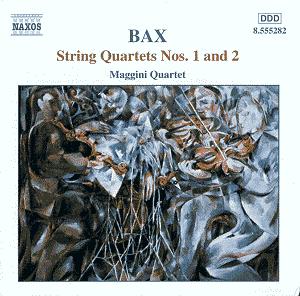 Composer: Sir Arnold BAX (1883-1953)
Composer: Sir Arnold BAX (1883-1953)
Works: String Quartet No. 1 in G major (1918), String Quartet No. 2 in A minor (1925)
Performers: Maggini String Quartet
Recording: 19-21 December 1999, Potton Hall, Suffolk
Label: NAXOS
Sir Arnold Bax occupies a unique position in the pantheon of British composers, often overshadowed by the more prominent figures of his time. His chamber music, particularly the two string quartets featured in this Naxos release, offers a rich tapestry of melodic and harmonic exploration that reflects the complexities of post-World War I sentiment. While Bax’s orchestral works, replete with lushness and romantic indulgence, have garnered more attention, these quartets reveal a more intimate side of his artistry, characterized by nuanced interplay and emotional depth. This collection serves as a timely reminder of Bax’s considerable contributions to the genre and the inherent charm and sophistication of his compositions.
The Maggini String Quartet delivers a compelling interpretation of both quartets. In the String Quartet No. 1 in G major, the performers navigate the three movements with an admirable blend of precision and warmth. The opening Allegro moderato unfolds with a lyrical grace that captures Bax’s penchant for expansive melodies. The quartet’s ability to articulate the thematic material shines, particularly in the dialogue between the first violin and cello, where their contrasting timbres create a compelling sonic landscape. The second movement, marked “Allegro,” is infused with rhythmic vitality, and the Maggini’s tight ensemble playing ensures that the lively themes are articulated with clarity and infectious energy.
Turning to the String Quartet No. 2 in A minor, the ensemble’s interpretation becomes even more nuanced, reflecting the work’s complexity. Here, Bax’s ambition surfaces through intricate counterpoint and rich harmonic language. The Molto espressivo slow movement is particularly striking, even if its ten-minute span may feel stretched to some listeners. The Maggini Quartet navigates the emotional landscape with sensitivity, drawing out the poignancy of the harmonies while maintaining the tension inherent in the score. The lively finale, complete with a funeral episode, showcases their adeptness at contrasting moods, from exuberance to somber reflection, encapsulating the essence of Bax’s musical narrative.
The recording quality is commendable, capturing the rich sonorities of the strings with clarity and depth. The acoustic space of Potton Hall provides an atmospheric backdrop that enhances the listening experience, allowing the subtleties of the ensemble’s dynamics to emerge without overshadowing the intricate textures of the music. The balance between instruments is expertly managed; the warmth of the cello complements the brightness of the first violin, creating a harmonious blend that is both inviting and engaging.
In the broader landscape of string quartet literature, Bax’s contributions deserve more recognition and performance. Comparatively, the Maggini’s interpretations stand favorably against other recordings of these quartets, including those by the Allegri String Quartet, which often favor a more traditional approach. The Maggini’s fresh perspective brings out the vitality of Bax’s writing, affirming the relevance of his music to contemporary audiences.
This Naxos release, featuring the Maggini String Quartet, is an essential addition to the catalog of British chamber music. It not only highlights the emotional and technical complexity of Bax’s quartets but also showcases the ensemble’s skill and interpretative insight. For listeners seeking to expand their understanding of British music, this recording is both an enlightening and enjoyable experience. The duo of quartets serves as a testament to Bax’s enduring legacy and the richness of his melodic and harmonic language.


